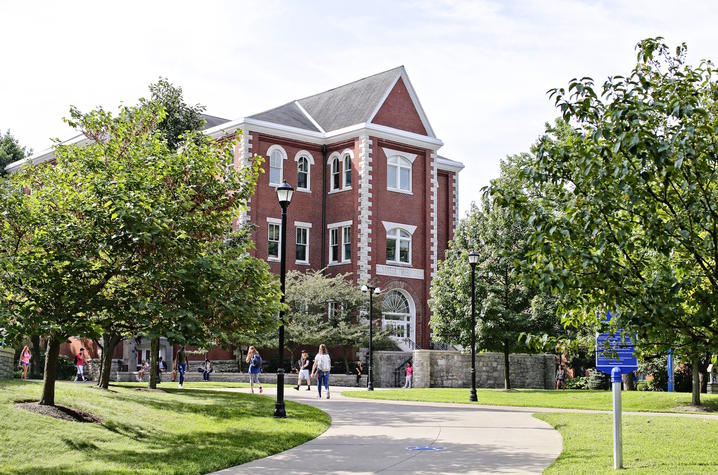UK Continues Progress on Greenhouse Gas Emissions Reductions
LEXINGTON, Ky. (Dec. 16, 2016) — Citing the leadership of students and more than a decade of commitment, University of Kentucky President Eli Capilouto announced Thursday a new greenhouse gas emissions reduction commitment that spells out steps to continue progress in creating a more sustainable campus environment.
"As the Commonwealth's flagship university, UK is uniquely positioned to serve as a leader in environmental sustainability,” Capilouto said. “We have been building a strong model for sustainability on this campus for more than a decade. Now, with the leadership of our students, faculty and staff – particularly the President’s Sustainability Advisory Committee (PSAC)– we are ready to take this next, important step forward."
Reducing emissions will improve our shared environment. At the same time, it will reduce UK's utility costs.
The reduction commitment announced today is the result of more than a year of work by the PSAC, an advisory committee appointed by Capilouto to examine on an ongoing basis how the university can improve and maintain environmental stewardship and sustainability. The advisory committee worked closely with Mary Vosevich, UK’s vice president for facilities management, Eric N. Monday, the university’s executive vice president for finance and administration, and UK’s student group Greenthumb to draft the commitment.
“This commitment will bring together and elevate many of our sustainability initiatives through the common thread of their emissions reduction impact and will challenge us to develop new initiatives,” says Shane Tedder, UK’s Sustainability Coordinator. “This also highlights to our students that climate change is an issue they will be challenged to address regardless of the career path they choose.”
The commitment also emphasizes the importance of addressing climate change through scholarship. The newly formed Faculty Sustainability Council will work with campus stakeholders to explore and initiate opportunities to support sustainability-driven research, teaching and learning. Staff from the Office of Sustainability and Facilities Management have started the evaluation of possible mitigation strategies and with the help of PSAC and the Faculty Sustainability Council plan to establish a detailed action plan by the end of the spring semester.
In the last decade, the university has placed an increasing emphasis on sustainability measures and planning (related UK STARS report). Major milestones include:
- The University created a sustainability task force in 2005 which led to the creation of the President’s Sustainability Advisory Committee (PSAC) in 2008.
- In 2009, the University adopted the commonwealth’s high performance building standards. These standards increased the sustainability of new construction by exceeding the energy efficiency set by building code. Since that time, UK has initiated more than 20 LEED certified building projects.
- In 2009, the Office of Sustainability, the Student Sustainability Council and the Tracy Farmer Institute for Sustainability and the Environment were officially established.
- In 2011, the University implemented $25 million of energy conservation measures in 61 campus buildings. The self-funded project improved the indoor environment for the occupants while reducing energy costs by over $2 million per year.
- In 2013, the University hired a campus energy engineer to focus on conservation and optimization. This has resulted in a wide range of initiatives including the installation of a 56 Kilowatt solar system that is integrated with College of Engineering curriculum.
- In 2014, the University partnered with EDR (Campus Housing Partner) on the installation of a geothermal system that provides efficient heating and cooling for Donovan and Johnson Halls.
- In 2014, sustainability was included as one of the seven core principles in the University Master Plan. This set the course for the creation of a Transportation Master Plan (2015), Campus Landscape Guidelines (2015), and a Utilities Master Plan (2016) that all prioritized sustainable development.
- In 2014, the University created the Sustainability Challenge Grant Program. This program has resulted in nearly 60 abstracts submitted for consideration and 20 funded projects totaling $500,000 to improve sustainability at UK.
- In 2015, UK Parking and Transportation Services (PTS) partnered with Lextran on the BluPass program to provide free public transportation to all students, faculty, and staff. Additionally, PTS has led efforts to dramatically improve bicycle infrastructure and facilities on campus over the past six years.
- The University has incorporated sustainability into the curriculum. In 2015, UK offered 318 courses that were sustainability-focused or sustainability-related.
- In 2016, the University created a new Utilities and Energy Management division within Facilities Management to guide implementation of the Utilities Master Plan and UK Healthcare established a Sustainability Steering Committee.
“We are, above all else, a learning institution,” Capilouto said. “This new commitment will catalyze not only concrete, strategic actions that will improve our environment, but also a thoughtful approach to how these issues can help further our educational and scholarly missions.”





